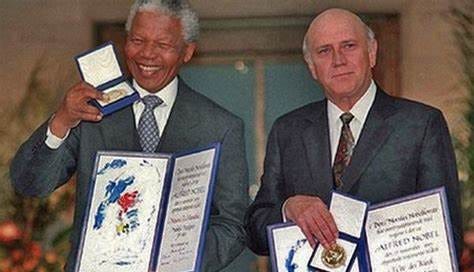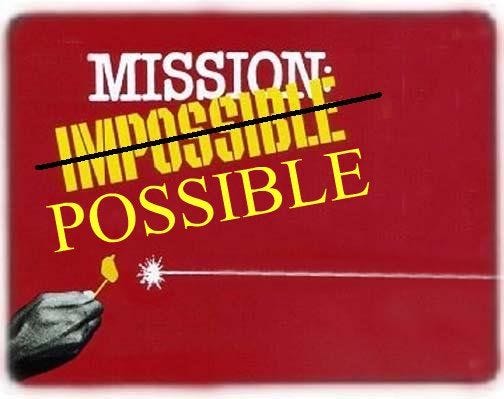“It always seems impossible until it’s done.” — Nelson Mandela
On the list of things that seemed impossible until they were done, ranking way at the top is Nelson Mandela and Frederik Willem de Klerk sharing the Nobel Peace Prize in 1993 for the peaceful termination of the apartheid regime in South Africa. FW de Klerk was a White man born into the deeply entrenched system of apartheid in South Africa who, when elected to parliament, supported and enforced that system. But by the time he became president he had changed his views, and he worked to replace apartheid with a fairer form of government.
Nelson Mandela was Nelson Mandela.
Imagine the two of them dismantling apartheid together. Imagine them sharing the Nobel Peace Prize. Seems impossible. But that is what happened.
Right now, so much seems impossible. So much is being asked of those of us who love freedom and democracy. Ever since the inauguration on January 20, 2025, many Americans have felt assaulted by one outrageous action after another on the part of the new administration. That is true for me at least. That’s why I wanted to take a look at the truth behind Nelson Mandela’s quotation about things impossible and possible.
Nelson Mandela was born to be a leader. The son of Chief Henry Mandela of the Madiba clan, he was raised to take his father’s place as chief when his father died. Nelson had other ideas, however. He gave up his claim to be chief in favor of attending law school. In his mid-twenties, he joined the African National Congress. That was the start of his activism in support of Black liberation, work that would land him in and out of court and jail for the next 20 years until, finally, in 1964, he was sentenced to life in prison. There he remained until February 1990, when the South African government under de Klerk finally released him. During that time, apartheid was increasingly and vociferously condemned by nations all over the world, and Mandela’s freedom became a cause celebre. Upon his release from prison, Mandela worked with de Klerk to help end apartheid in South Africa, a collaboration no one could have imagined in earlier years. In 1994, he became South Africa’s first Black president.
As to de Klerk, evolution took a different turn. He was born to White privilege and even spent the early part of his political career supporting and upholding apartheid. And yet when he was elected to State President in 1989, he decided to end apartheid. After his opening address to Parliament in February 1990, he began releasing political prisoners, including Mandela. In the next few years, he worked with the various sectors of South African society, and with Nelson Mandela in particular, to replace apartheid with multi-ethnic governance. His legacy is tarnished by the violence and oppression he supported in his earlier years, and yet he was able to make an inner transformation so remarkable that it translated to being a key figure in ushering in a whole new era for South Africa. De Klerk left behind a recorded message to be released upon his death: "Let me today, in the last message repeat: I, without qualification, apologise for the pain and the hurt, and the indignity, and the damage, to black, brown and Indians in South Africa."
That summary of the two men is about as brief as I could make it and still give some sense of how far the two of them had to traverse to reach a juncture where they shared a Noble Peace Prize. And, actually, even though I know it happened, and even though I just now read about it all over again, I still find it so hard to believe. Can you imagine? The one man, Mandela, born to a native tribe, growing up in a system of deep-seated oppression, training to be a lawyer, working as a Black activist, then spending decades — decades — incarcerated, only to emerge with enough fortitude, strength of self, commitment, and vision still intact to collaborate with his former oppressors to create something new? Can you imagine someone voluntarily relinquishing the kind of power de Klerk had been raised to expect and had always experienced and working with one of his greatest former foes to build a new nation? Can you imagine?
I have a hard time imagining it. But, because it happened, I know it was possible. And, because it happened, I know the impossible actually may be — just may be — possible.
I need stories of hope these days. I need exemplars of people who have the courage and imagination to rise above their circumstances and dream something bigger, better, and bolder than what has previously existed. I need to be reminded that whatever is happening now will not be happening forever and that I — yes, even little old me — I can be an agent of change. I can hold out a vision for something better, and I can set my feet on that path. Even if my contributions are humble, I can offer them.
Nelson Mandela once said, “One cannot be prepared for something while secretly believing it will not happen.” Despite everything — the violence, the history that indicated otherwise, the incarceration, the deeply intrenched racism — despite all of that, Mandela must have believed that, yes, even the impossible could happen. If he could believe that, maybe I can, too.
F. W. de Klerk once said, "Yesterday is not ours to recover, but tomorrow is ours to win or lose." In the tomorrow I want to win, little children do not live in fear. In the tomorrow I want to win, the hungry are fed. In the tomorrow I want to win, everyone has a fair chance to succeed. In the tomorrow I want to win, no one is cast down because of gender, race, religion, class, sexual orientation, or belief. In the tomorrow I want to win, all are treated with dignity, and all are welcome. In the tomorrow I want to win, honesty, humility, and mercy are offered to and expected of one another.
Sound impossible? It may seem impossible. Until it is done.
Love,
Sylvia
F.W. de Klerk | Biography, Accomplishments, Nobel Prize, & Facts | Britannica
Nelson Mandela - Anti-Apartheid, Imprisonment, Activist | Britannica
Nelson Mandela ‑ Quotes, Biography & Death | HISTORY
FW de Klerk: South Africa's last apartheid president dies at 85







Timely and uplifting as always! Thank you.
Thanks for this hopeful and inspiring story!